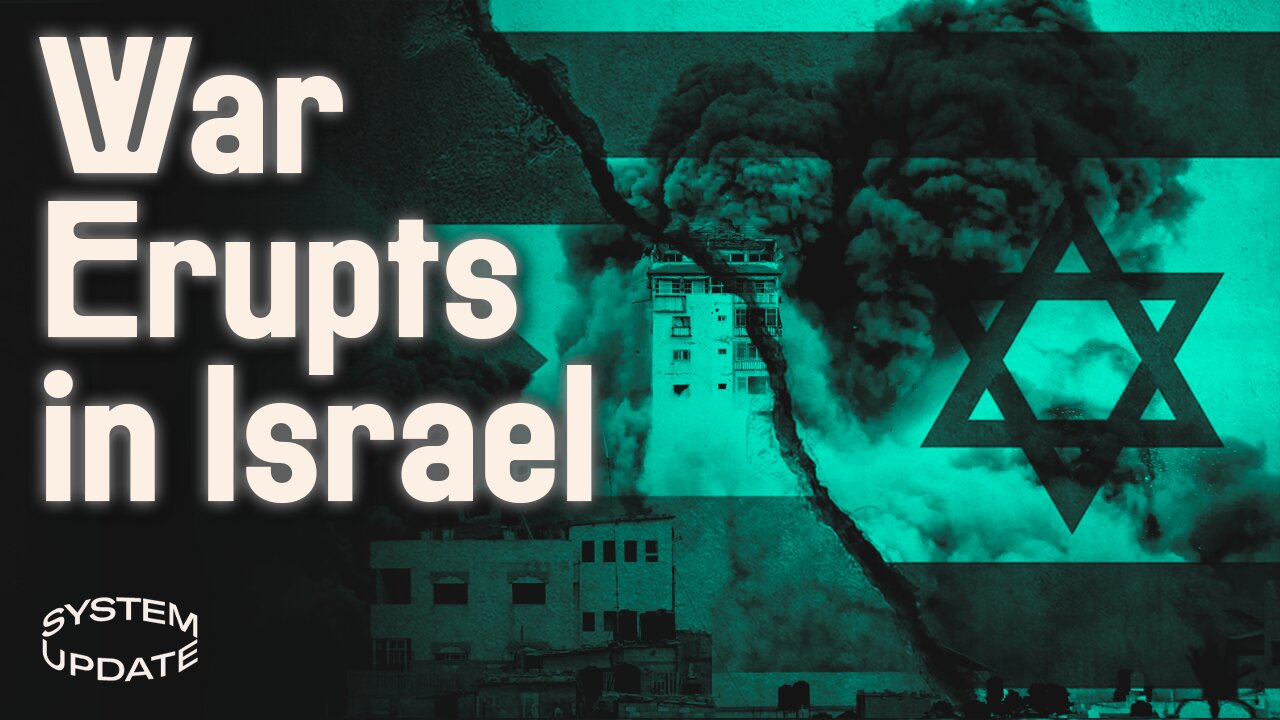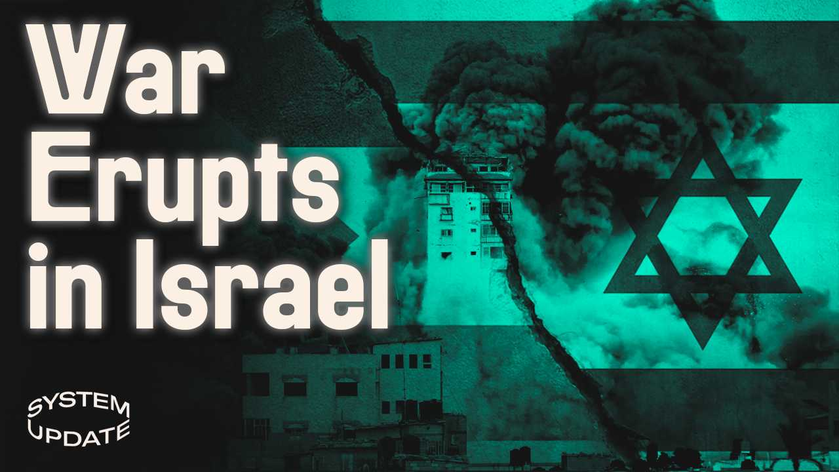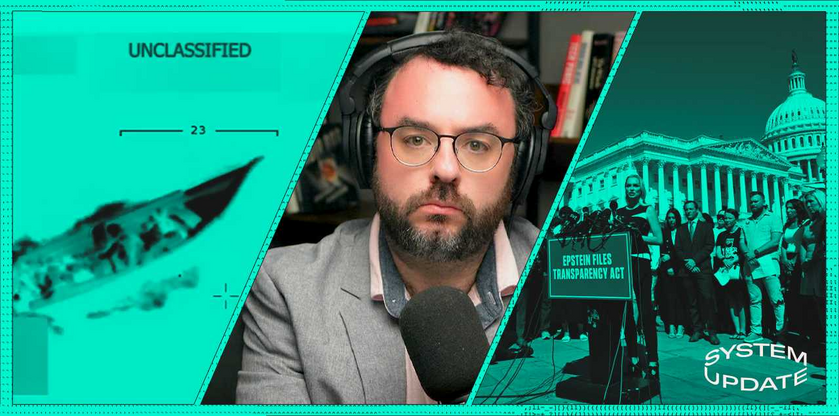Watch the full episode here:

It's Monday, October 9.
Tonight: War between Israel and the Palestinians, both in the West Bank and Gaza, has existed for decades, sometimes actively and sometimes latently. One of the most dangerous and intense stages of this war exploded just over 48 hours ago when the group that has ruled Gaza since 2006, Hamas, invaded Israel by land, by sea, and even by air, using hang gliders armed with machine guns to fly over the border fence separating Gaza from Israel within hours. They killed hundreds of Israeli civilians, many of whom died from civilian massacres, gunning down young people at an all-night rave as it was ending or entering family homes and shooting men, women and children. At least dozens of Israelis were abducted and taken as hostages back to Gaza. Israel now places the death toll at more than 900 citizens, with more than 1700 wounded. Hamas announced that four hostages have already died in the Israeli airstrikes and has threatened to execute hostages and post the video online in response to large numbers of civilian deaths in Gaza.
Meanwhile, as has happened so many times before, Israel, the following day began bombing from the air and reducing to rubble entire buildings and towers in Gaza, the tiny strip of land that is home to 2.2 million Palestinians, the majority of whom are 18 years of age or younger, and who are physically blockaded by both Israel and Egypt from leaving that tiny strip of land. An Israeli ground invasion of Gaza is imminent. Israel's defense minister, Yoav Gallant, ordered, “a complete siege” on the Gaza Strip, saying Israeli authorities would cut electricity, and water and would block the entry of fuel. He said in a video statement: “No electricity, no food, no water, no gas. It's all closed.” Israeli Prime Minister Benjamin Netanyahu went to X, formerly known as Twitter, earlier today, just a few hours ago, to post a video showing the Israeli Air Force bombing and destroying large high rises in Gaza City, sometimes with one bomb destroying several towers at once.
The Biden administration immediately did what American administrations and both parties have done for decades whenever Israel is involved in hostilities, namely, announce various forms of assistance to its close ally in the Middle East, including weapons and large amounts of money for Israel's intended military action. With a tiny handful of exceptions – and I mean a tiny handful –, members of both political parties in Washington vowed steadfast and unstinting support for Israel and condemned Hamas's actions, particularly those aimed at civilians.
The risk of escalation and wider regional conflict is very high and very self-evident. There have already been gunfire exchanges between the IDF and Hezbollah, the militia and political party based in southern Lebanon that has previously engaged in bloody and protracted battles with Israel. The Wall Street Journal cited anonymous sources from Hamas to claim that Iran directly participated in the planning of these attacks, though the U.S. government denies knowledge of any information confirming that obviously inflammatory claim. Israeli tourists were shot and killed in Egypt due to their nationality, and several Arab states have already firmly sided with the Palestinians and blamed Israel for these hostilities, including Qatar and Saudi Arabia, with whom Israel had been hoping to conclude a peace deal brokered by the Biden administration. This is a volatile region in the best of times, making the risk of escalation quite obvious and quite dangerous.
When it comes to U.S. political debates, there's always been a paradox, or two paradoxes, actually, when it comes to Israel. The first is that there are few debates, if there are any, that provoke as much emotion, passion, anger, conviction and absolutism among Americans as conflicts involving this foreign country. There's more space to debate almost anything of that in the U.S., including policies that have a direct effect on Americans, even American wars, than there is space to discuss and debate questions involving Israel, especially when, as is obviously true now, passions are running extremely high. The second paradox is that there is far more criticism of the Israeli government and far more debate over Israel's actions in Israel than there is in the United States. One needs only read an Israeli newspaper or listen to an Israeli news broadcast to see how much more vibrant the debates are about their own country than they are in the United States.
Unless one firmly plants oneself on one side of this war or the other, and then proceeds to unquestioningly affirm every last premise of that side by, for instance, arguing that anything and everything Palestinians do is justifiable in order to resist the occupation of the West Bank and the blockade of Gaza – even including deliberately massacring civilians –, or by arguing that anything and everything Israel does is justified in the name of stopping Palestinian attacks on their country – including mass indiscriminate bombing of civilian infrastructure – then, one is bound to anger a certain portion of one's audience.
We fully realize that delving into this topic can be a thankless task. It often is, but we also strongly believe that the audience we have attracted and cultivated does not come to the show or my journalism, expecting to always have their most closely held views, flattered and unquestioningly vindicated, but instead is not only willing but eager to sometimes have those views questioned and prodded and pushed a bit – provided it's done in a respectful, thoughtful and substantive manner. So that is what we are going to endeavor to do tonight. There is no other way. The United States is a direct participant in that region and all matters involving Israel, including this one. The potential consequences of this war are vast and grave. No matter how much one might wish to, there is no avoiding this topic, no avoiding this war. And ultimately, the only kind of journalism worth doing is one based on respect and trust for one's audience – that they seek, not full and reflexive and constant agreement, but fact-based and thoughtful analysis.
For now, welcome to a new episode of System Update, starting right now.


















